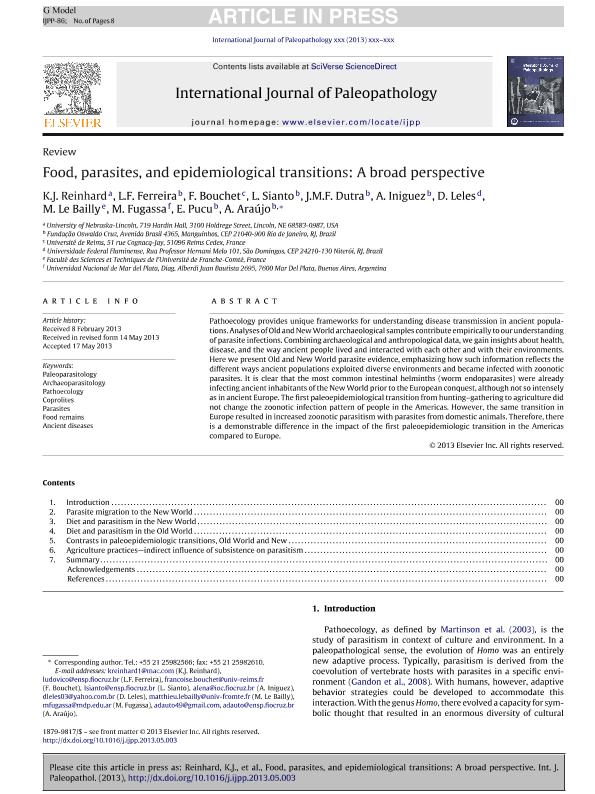Artículo
Food, parasites, and epidemiological transitions: A broad perspective
Reinhard, K. J.; Ferreira, L. F.; Bouchet, F.; Sianto, L.; Dutra, J. M. F.; Iniguez, A.; Leles, D.; Le Bailly, M.; Fugassa, Martín Horacio ; Pucu, E.; Araújo, A.
; Pucu, E.; Araújo, A.
 ; Pucu, E.; Araújo, A.
; Pucu, E.; Araújo, A.
Fecha de publicación:
09/2013
Editorial:
Elsevier Science
Revista:
International Journal of Paleopathology
ISSN:
1879-9817
Idioma:
Inglés
Tipo de recurso:
Artículo publicado
Clasificación temática:
Resumen
Pathoecology provides unique frameworks for understanding disease transmission in ancient populations. Analyses of Old and New World archaeological samples contribute empirically to our understanding of parasite infections. Combining archaeological and anthropological data, we gain insights about health, disease, and the way ancient people lived and interacted with each other and with their environments. Here we present Old and New World parasite evidence, emphasizing how such information reflects the different ways ancient populations exploited diverse environments and became infected with zoonotic parasites. It is clear that the most common intestinal helminths (worm endoparasites) were already infecting ancient inhabitants of the New World prior to the European conquest, although not so intensely as in ancient Europe. The first paleoepidemiological transition from hunting-gathering to agriculture did not change the zoonotic infection pattern of people in the Americas. However, the same transition in Europe resulted in increased zoonotic parasitism with parasites from domestic animals. Therefore, there is a demonstrable difference in the impact of the first paleoepidemiologic transition in the Americas compared to Europe. © 2013 Elsevier Inc.
Archivos asociados
Licencia
Identificadores
Colecciones
Articulos(CCT - MAR DEL PLATA)
Articulos de CTRO.CIENTIFICO TECNOL.CONICET - MAR DEL PLATA
Articulos de CTRO.CIENTIFICO TECNOL.CONICET - MAR DEL PLATA
Citación
Reinhard, K. J.; Ferreira, L. F.; Bouchet, F.; Sianto, L.; Dutra, J. M. F.; et al.; Food, parasites, and epidemiological transitions: A broad perspective; Elsevier Science; International Journal of Paleopathology; 3; 3; 9-2013; 150-157
Compartir
Altmétricas



